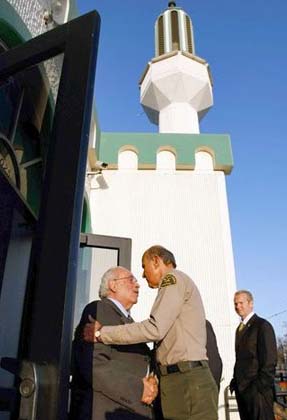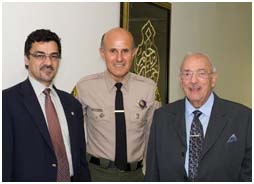Brothers and Sisters of Christ – please note that too many of our leaders are actively working with the Muslim Brotherhood … Please join with The Way TV as we work together to expose this.
Brother Steve Klein … L.A. Times article below – NOTE: I added the photos of Sheriff Baca with 2 known members of the Muslim Brotherhood … April 19, 2011.
…
In Muslim community, Baca wins support through conversation, not confrontation The L.A. County sheriff, a Republican with a strong reputation as a crime fighter, believes in building trust within minority communities. He reads the Koran and shuns hard-line tactics.
The L.A. County sheriff, a Republican with a strong reputation as a crime fighter, believes in building trust within minority communities. He reads the Koran and shuns hard-line tactics.
Syed Arif Rizvi, left, president of the Islamic Center of the San Gabriel Valley, joins Deputy Sherif Morsi and Sgt. Mike Abdeen in prayers. The two lawmen work with the Sheriff's Department's Muslim community affairs unit. (Irfan Khan / Los Angeles Times)
By Robert Faturechi, Los Angeles Times
April 19, 2011
Reporting from New York—
Three young women, all wearing delicate hijabs, are gathered outside a TriBeCa lecture hall in eager anticipation. It's not an actor or a pop star they're waiting for. The object of their giddiness is Sheriff Lee Baca, in town for just one night.
(Photo at right: Maher Hathout, Muslim Brotherhood leader arrested and imprisoned in Egypt for being a Muslim Brotherhood leader and L.S. Sheriff Baca.)
It might be unusual for a lawman anywhere to have fans, let alone one a continent away from his jurisdiction. But such is the life of Los Angeles County's chief law enforcement officer since his outspoken support of American Muslims vaulted him into the national spotlight.
"I just want to meet you and thank you," one young woman blurts out after catching Baca outside a recent speaking engagement on Muslim outreach. "You gave us a voice." In an only-Nixon-could-go-to-China kind of way, Baca, a former Marine reservist and registered Republican, has been largely immune to the innuendo that has caused other politicians to distance themselves from Muslims post 9/11. He has bucked the hard-line law enforcement approach of security checks and surveillance in favor of outreach and cooperation.
In an only-Nixon-could-go-to-China kind of way, Baca, a former Marine reservist and registered Republican, has been largely immune to the innuendo that has caused other politicians to distance themselves from Muslims post 9/11. He has bucked the hard-line law enforcement approach of security checks and surveillance in favor of outreach and cooperation.
(Photo Left: Sheriff Baca with 2 Musliim Brotherhood leaders in America – left Salam Al-Marayati, Executive Director, MPAC and Maher Hathout.)
His law-and-order credentials have made him an irresistible ally for Muslim advocates, earning him shout-outs on national TV shows, including "The Colbert Report" and invitations to the halls of Congress. On more than one occasion he's been the only law enforcement official willing to mix it up with Republican lawmakers on the issue.
In New York, where Baca preached the benefits of Muslim outreach on a panel about national security, the sheriff seemed energized by his warm reception. "Did you see those girls? Do they look like terrorists to you?" he said of the gaggle of young Muslim women who greeted him. "They're not terrorists. I know my public."
Reading the Koran
The events of 9/11 quickly took Baca in an unusual direction. When many politicians chose an arms-length approach to Muslims, Baca chose the Koran — literally. In the black sedan that ferried him from one engagement to another, he pored over the book, reading it from front to back, memorizing passages.
Within days of the terrorist attack, Baca met with local Muslim leaders, promising them protection. Responding to reports that Pakistani store owners were being hassled, Baca ordered his deputies "to go by the 7-Elevens and offer support."
His empathy for a persecuted minority, he says, isn't rooted in any sort of shared experience as a Mexican American but in an unusual childhood.
The son of a seamstress who had to care for three children on her own, Baca was sent as a boy to live with his pensioner grandparents in East L.A. His developmentally challenged uncle, then in his 30s, still lived at the home.
"He was a pound and a half at birth," Baca said. "Couldn't read, write, speak sentences. My uncle had no faculty, no capacity." With no household car, 7-year-old Leroy, his uncle and his grandmother traversed the city by bus. Those rides had a lasting effect.
With no household car, 7-year-old Leroy, his uncle and his grandmother traversed the city by bus. Those rides had a lasting effect.
"People would sneer at my uncle, laugh at him, make fun of him, and I believe that's wrong," Baca recalled. "We're not bothering anyone. So how about just leaving us alone? Is that asking too much?"
His affinity for minority communities had political benefits. A long-shot candidate for sheriff in 1998, Baca got creative in his campaigning, tapping ethnic groups other candidates ignored.
"I had to have other bases of support outside the traditional realms," he said. Among them were Iranians, Lebanese and other groups with large Muslim populations.
But his decision to intensify those ties post 9/11, he says, wasn't political. Lapses on the federal level exposed by the attacks put a newfound pressure on local law enforcement. "All of our lives have been changed by 9/11," Baca said. "We're the ones who will get slammed if something falls through the cracks."
Thousands of tips flooded law enforcement agencies after 9/11. Even leads that seemed silly had to be followed. "The one you don't follow will end up being the one that matters," Baca said. In one instance, a local group of Muslim men frequenting paintball facilities were investigated as potential terrorist snipers. They turned out to be "a buncha guys who just liked paintballing," Baca said. "What are you gonna do? Ignore it?"
To pinpoint legitimate concerns, Baca needed his deputies inside Muslim communities. His focus on homegrown terror grew after the 2005 London Underground bombings, when four men, all living and working in England for years, killed 52.
http://www.latimes.com/news/local/la-me-baca-muslim-20110419,0,213771.story?track=rss




